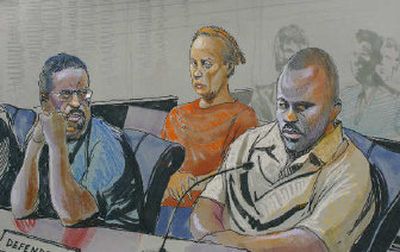Coke case like a ‘spy novel’

ATLANTA — A secretary accused of helping two men steal trade secrets from The Coca-Cola Co. and trying to sell them to rival PepsiCo Inc. was ordered released on bond Thursday in a blockbuster case her lawyer likened to “a spy novel.”
Joya Williams’ co-defendants, a pair of ex-cons who served time together at the same federal prison in Alabama, were detained pending a preliminary hearing for all three on Tuesday. Their attorneys would not say how Williams knew the two men.
Williams’ lawyer, Wanda Jackson, said outside the federal courthouse that the defense needs to see the product sample her client allegedly stole from Coke to be able to defend her properly. Jackson also suggested the product may not be as secretive as Coke has suggested.
“It does sound like something out of a spy novel or movie,” Jackson told reporters outside the courthouse. “Why would they leave a product in an office that was easily accessible? What was in it.”
Coke hasn’t said. Jackson said the defense should be able to test the product.
“The whole thing belies common sense,” she said of the accusations.
The suspects were arrested Wednesday — the day a $1.5 million transaction was to occur. They are charged with stealing confidential information, including a sample of a new drink, from Coke and trying to sell it to Pepsi.
Williams, who worked as an administrative assistant for a Coke executive at the corporate headquarters in Atlanta, is accused of rifling through corporate files and stuffing documents and a new Coca-Cola product into a personal bag. She has since been fired, the judge said during Thursday’s hearing.
The three suspects face charges of wire fraud and unlawfully stealing and selling Coke trade secrets.
As the suspects appeared in court, more details about their backgrounds emerged.
At the time of the alleged theft, Williams, 41, of Norcross, Ga., had been working for a senior Coke manager, Javier Sanchez Lamelas, who is a global brand director for the beverage giant, the company said. She doesn’t have a criminal record, according to her attorney.
Duhaney, of Decatur, Ga., who told the judge he is 42 though federal prosecutors list him as 43, served nearly five years of a seven-year sentence for possession of cocaine with intent to distribute at a federal prison in Montgomery, Ala., according to U.S. Bureau of Prisons spokesman Mike Truman. He was released in February 2005.
Dimson, of New York, who told the judge he is 28 though prosecutors list him as 30, served less than one year of a two-year sentence for conspiracy to commit bank fraud at the same prison as Duhaney, Truman said. He arrived in 2003 and was released in 2004, meaning he was there at the same time as Duhaney.
Coca-Cola and Pepsi, usually bitter enemies, worked together to foil the alleged trade secrets theft plot.
According to prosecutors, on May 19, Purchase, N.Y.-based PepsiCo provided Coke with a copy of a letter mailed to Pepsi in an official Coca-Cola business envelope. The letter, postmarked from the Bronx in New York, was from an individual identifying himself as “Dirk,” who claimed to be employed at a high level with Coca-Cola and offered “very detailed and confidential information.” “Dirk” was later identified as Dimson, the FBI says.
Coca-Cola immediately contacted the FBI and an undercover FBI investigation began.
Prosecutors say Williams was the source of the information Dimson offered to provide to Pepsi. They say that “Dirk” provided an FBI undercover agent 14 pages of Coca-Cola documents marked classified and confidential. The company confirmed that the documents were valid and highly confidential and were considered trade secrets. Prosecutors say “Dirk” requested $10,000 for the documents.
Later “Dirk” produced other documents that Coca-Cola confirmed were valid trade secrets of Coca-Cola. He also agreed to be paid $75,000 for the purchase of a highly confidential product sample from a new Coca Cola project, prosecutors said.
During a meeting at the Atlanta airport, an undercover agent later paid “Dirk” part of that money, placing the cash inside a yellow Girl Scout cookie box. “Dirk” handed the agent some documents in an Armani bag and the Coke product sample, an FBI affidavit says.
Then on June 27, an undercover FBI agent offered to buy other trade secret items for $1.5 million from “Dirk.” The same day a bank account was opened under the names of Duhaney and Dimson, and the address used on the account was that of Duhaney’s residence, prosecutors said.